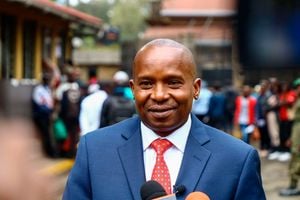FGM: 13-year battle with entrenched harmful practice

Some of the girls arrested after undergoing FGM at Giika in Igembe South, Meru County, on August 12, 2024.
What you need to know:
- In 2011, Kenya legislated the Prohibition of Female Genital Mutilation Act, a law that carries a minimum punishment of three-year imprisonment and a Sh200,000 fine for those found culpable.
- The law also established the Anti-FGM Board, which advises the government on the implementation of the Act; designs; supervises; and coordinates public awareness programmes.
Since the enactment of the 2010 Constitution, the fight against female genital mutilation has gained momentum.
In 2011, Kenya legislated the Prohibition of Female Genital Mutilation Act, a law that carries a minimum punishment of three-year imprisonment and a Sh200,000 fine for those found culpable. It prohibits FGM and declares it a retrogressive practice.
The law also established the Anti-FGM Board, which advises the government on FGM and the implementation of the Act; designs; supervises; and coordinates public awareness programmes against the practice.
There have been heightened activities across the areas with high FGM prevalence to tame the vice. In the past 10 years, Kenya has registered notable milestones.
The Kenya Demographic and Health Survey 2022 revealed a 15 per cent prevalence nationwide among females aged 15 to 49. This is a decrease from 21 per cent in 2014.
Through the efforts of the government, led by the Anti-FGM Board, elders from the Samburu, Pokot and Abakuria communities have made public declarations against FGM. Elders, religious leaders and boda boda operators have also been enlisted in the campaigns to end the decades-old cultural practice.
In 2021, Samburu elders signed a historic declaration to end FGM and child marriage dubbed Kisima Declaration. The historic move saw the elders denounce FGM and child marriage and affirmed their resolve to eliminate them.
The elders were drawn from the six sacred mountains of Samburu. They further lifted the cultural curse on girls who have not undergone the cut. The curse had been one of the drivers of FGM as girls opted to undergo circumcision for social acceptance.
This now meant the girls could be accepted and allowed to participate in cultural celebrations, activities and other rites from which they had been banned.
Former President Uhuru Kenyatta witnessed the signing of the declaration at Kisima grounds, a sacred site among the Samburu where blessings and solemn oaths are performed.
In the same year, elders from the Kuria community also signed a memorandum of understanding with the government to end FGM. The elders, who were drawn from the four clans of Kuria, pledged their commitment to the campaigns.
Carol Saoli from Polonga village in Narok North recalls undergoing FGM while she was 13. She tells Nation.Africa how on that chilly morning, she, together with eight other girls from her extended family, was subjected to the cut.
Later, Carol, 61, says she went on to become a cutter herself, earning Sh1,500 per cut. She, however, says things changed after the enactment of the Anti-FGM Act.
“After the enactment of the law, it became difficult to continue cutting girls. Many cutters and parents were arrested for abetting the crime. I had to abandon the trade to focus on a different economic activity that would not put me in trouble with the law,” Carol says.
Now an anti-FGM crusader, the mother of six is involved increasing awareness in the Maasai community of the dangers of FGM. “The increased efforts by the government and other stakeholders to eradicate FGM is paying off. The cut has, for example, greatly gone down in the Maasai community. However, more need to be done to wipe out medicalised FGM that is now becoming common.”
Jacinta Merinok, for her part, says she is happy with the anti-FGM campaign for saving her from the cut. “My parents said they would not subject me to the cut as they did not want to be arrested and taken to jail. That’s how I survived and was able to pursue my studies.”
Jacinta, a second year student Diploma in Tourism Management at a college in Narok, reveals that she is involved in awareness campaigns. “During weekends, we conduct anti-FGM awareness campaigns in the community. We go to schools, churches and other public forums where we sensitise girls and the community to the dangers of this outdated cultural practice.”
She notes that anti-FGM initiatives in the community are paying off as more girls are not being subjected to the cut.
Anti-FGM Chief Executive Officer Bernadette Loloju says great progress has been made in the fight as witnessed in the national prevalence drop. Ms Loloju adds that central Kenya is an area where FGM is non-existent but added that the presence of some cults with weird FGM teachings is worrying.
“It will be hard to take back communities and the country where we have come from. We are doing everything possible to win the war on these outdated cultural practices.”
She says they are involving men through male engagement to end FGM in 22 hotspot counties. According to the Anti-FGM Board, there have been 303 arrests, 300 cases taken to court, 55 convictions and sanctions since 2018.
Peter Kemei, the head of Operations at the Men End FGM Foundation, says there has been some progress in some counties. He singles out West Pokot, Kajiado and Narok.
Mr Kemei adds that the FGM prevalence drop from 21 in 2014 to 15 per cent in 2022 is another testament that the vice is declining.
“Despite the drop in national prevalence and in some counties, we have a scenario where FGM is still high is some regions like the Northeastern counties. We are also having a challenge to see that the vice is coming back in some counties where it was not practised like in the Mount Kenya region.”
However, despite the wins, there have been a number of setbacks. Cross-border and medicalised FGM have been singled out as emerging threats in the country and beyond.
Kisii County is one of the regions with high cases of medicalised FGM, with statistics from KDHS 2022 survey indicating a 77 per cent prevalence.
Anti-FGM Board is implementing a campaign to engage communities to mainstream anti-FGM messages in households and abandon medicalised FGM. The campaign also involves community health promoters. They are also engaging community-based organisations to sensitise locals to the adverse effects of FGM.
“Perpetrators are increasingly seeking the services of medical professionals to mutilate girls to circumvent the law. This is one of the emerging trends stifling the campaign to end FGM in the Gusii region,” the Board said in a statement.
Data presented at the International Conference on FGM in Tanzania last year shows both cross-border and medicalised FGM are rising at alarming levels, putting millions of girls at risk.
In 2023 alone, 4.3 million girls were at risk of FGM in Africa. An estimated 55 million girls under the age of 15 in 28 African countries have experienced FGM, with 20 per cent of them being subjected to medicalised FGM.
The delegates called on African governments to put in place strategies to end cross-border and medicalised FGM on the continent by 2030.
African countries greed on new measures to eliminate cross-border FGM. They include involving more healthcare professionals, training of healthcare providers to recognise and report FGM cases, and providing medical and much-needed psychological support to survivors.
The delegates also endorsed that countries allocate sufficient human and financial resources to oversee the implementation of comprehensive and multi-sectoral regional, national, and subnational plans, strategies, policies, and programmes to eliminate cross-border FGM.
Tony Mwebia, the founder of Men End FGM, is calling for the involvement of boys and men in the fight. “Not involving men and boys in fighting FGM is like a doctor treating symptoms of a disease and totally ignoring the disease.”
Ifrah Ahmed – the founder of Ifrah Foundation, an organisation fighting FGM in Somalia – emphasised the importance of gaining the support of respected religious leaders as they are the most listened to in the communities.
“FGM is a damaging cultural practice with serious consequences. We must work together to put an end to these harmful social norms and promote positive change,” she says.





